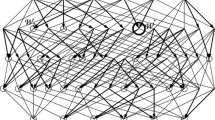Abstract
We study here the protectionist role of blocking coalitions in a voting game. More precisely, we first present necessary properties that a family of coalitions must satisfy in order to be the blocking family of some game and show that they are sufficient conditions too. Furthermore, a procedure to determine all games having a given blocking family is provided. With regard to uniqueness and multiplicity, (a) the blocking families that univocally determine the game are characterized by means of a separation condition, and (b) it is shown that in the nonseparating case at least three games share each nonempty blocking family, and an upper bound is given for the number of such games. Some numerical examples illustrate our results. Finally, power indices related to the blocking structure are discussed.
Similar content being viewed by others
References
Banzhaf JF (1965) Weighted voting doesn’t work: a mathematical analysis. Rutgers Law Rev 19:317–343
Carreras F (2004) α-decisiveness in simple games. In: Gambarelli G (ed) Essays on cooperative games (in honor of Guillermo Owen). Theory and decision library, series C. Kluwer Academic, Dordrecht, pp 77–91, chap 10
Carreras F (2005) A decisiveness index for voting and other systems. Eur J Oper Res 163:370–387
Carreras F, Freixas J (1996) Complete simple games. Math Soc Sci 32:139–155
Carreras F, Freixas J (2000) A note on regular semivalues. Int Game Theory Rev 2:345–352
Carreras F, Owen G (1997) Automorphisms and weighted values. Int J Game Theory 26:1–10
Coleman JS (1971) Control of collectivities and the power of a collectivity to act. In: Lieberman B (ed) Social choice. Gordon and Breach, New York, pp 269–300
Dragan I (1996) New mathematical properties of the Banzhaf value. Eur J Oper Res 95:451–463
Dubey P, Shapley LS (1979) Mathematical properties of the Banzhaf power index. Math Oper Res 4:99–131
Feltkamp V (1995) Alternative axiomatic characterizations of the Shapley and Banzhaf values. Int J Game Theory 24:179–186
Lehrer E (1988) An axiomatization of the Banzhaf value. Int J Game Theory 17:89–99
Owen G (1975) Multilinear extensions and the Banzhaf value. Nav Res Logist Q 22:741–750
Owen G (1978) Characterization of the Banzhaf–Coleman index. SIAM J Appl Math 35:315–327
Owen G (1995) Game theory, 3rd edn. Academic Press, San Diego
Roth AE (ed) (1988) The Shapley value: essays in honor of Lloyd S. Shapley. Cambridge University Press, Cambridge
Shapley LS (1962) Simple games: an outline of the descriptive theory. Behav Sci 7:59–66
Shapley LS, Shubik M (1954) A method for evaluating the distribution of power in a committee system. Am Political Sci Rev 48:787–792
Taylor AD, Zwicker WS (1999) Simple games: desirability relations, trading, and pseudoweightings. Princeton University Press, Princeton
Author information
Authors and Affiliations
Corresponding author
Additional information
Research partially supported by Grant SGR 2005–00651 of the Catalonia Government and Grant MTM 2006–06064 of the Education and Science Spanish Ministry and the European Regional Development Fund.
Rights and permissions
About this article
Cite this article
Carreras, F. Protectionism and blocking power indices. TOP 17, 70–84 (2009). https://doi.org/10.1007/s11750-009-0084-5
Received:
Accepted:
Published:
Issue Date:
DOI: https://doi.org/10.1007/s11750-009-0084-5



